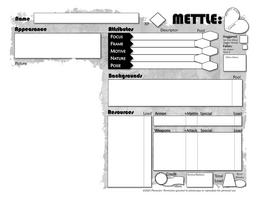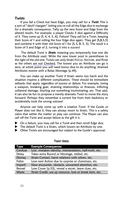METTLE Core update 1.1!




METTLE Core Errata
Version 1.0 to 1.1
This errata document lists the major changes to METTLE Core made between versions 1.0 and 1.1. The new text also contains numerous lesser edits, clarifications, and grammar fixes not mentioned here. You can update your digital file by downloading the new one.
I have not updated the print copy yet, as this will take a while. If you bought a print on demand copy, contact me at zhongjake@gmail.com for a special discount. This means you will only be responsible for the printing cost, shipping, and handling. Printing cost is currently $4.60, but subject to change.
Major Changes
Attributes and Descriptors (p.12)
• To be more intuitive, “Descriptors” have been changed to “Attributes” and “Tags” have been changed to Descriptors. I was making a fine point with the prior wording but it got lost in the terms people used in actual play. Other references to these terms were changed throughout.
Background Points (p.16)
• These have been changed to the sum of Focus, Motive, and Nature pools instead of half the sum of the total Descriptor pools. The new method is easier and provides more points for those who invest in those three Descriptors.
It now reads:
“These short phrases broaden the character by giving them a history and extra skills to go with it. You get dice to distribute into Background pools equal to the sum of your Focus, Motive, and Nature. Buy these on a one-for-one basis, with a maximum in any one Background equal to Focus. For example, if a character has a Focus 5, Motive 3, and Nature 3, they get 11 dice to spend on Backgrounds to a maximum of 5. One may switch Focus and a Background later if they are equal, reflecting a change in priorities.”
Twists (p.26)
• The Twists for Actions now have a universal default of lowering the Attribute used instead of many different individual defaults. This makes it easier to handle Twists without paging through the book and speeds negotiation over alternate Twists.
It now reads:
The default Twist is Strain, meaning you temporarily lose one die from the Attribute used. Write the new lower pool in parentheses to the right of the old one. Twists can only Strain FOCUS, NATURE, and POISE as the others are not Checked. The lowest you an Attribute can go is zero, at which point you will need bonus dice to do anything. Strained Attributes restore with a Relax Montage (p.50).
The table of alternate Twist ideas on the same page has been revised and renamed (“Twist Seeds”) to reflect these changes.
Taking Damage (p.28)
• The way negative Mettle works has been re-worked. Characters may drop below zero and still act with a penalty. The Fallen Status is now a voluntary condition that makes it much easier to recover later. This makes characters a bit more durable and allows for desperate heroic actions while wounded.
It now reads:
“Characters may suffer Damage from hazards (p.51) or attacks (p.38). Each point lowers their current Mettle by one. If their Mettle drops into the negative, they are Staggered. Staggered characters lose their Free Move and write down their negative Mettle as a Stagger penalty to all Checks. They may still Rally to restore Mettle, but the penalty persists until they make a Recover Check (p.48). If they drop into the negatives more than once, only the largest Stagger penalty counts.
While less heroic, it is often wiser to accept one’s fate and opt to become Fallen when their Mettle is negative. The Player must choose this upon taking the hit, no later. The advantage is that enemies tend to ignore them, and their chances at later Recovery are far better. The disadvantage is they lose their Action, and their POISE drops to zero. NPCs typically go right to Fallen when Staggered.
Death is possible if the Staggered or Fallen character fails a later Recovery Check. The Player may also just declare Death if they feel a dramatic event should be fatal. For example, falling into lava or staying behind on an exploding space station. Sometimes it’s better to go with a bang than it is to fade away. You can always make a new character.”
Status Effects(p.29)
• The Afflicted Status has been updated to reflect the new rules for Affliction.
It now reads:
Afflicted (p.51): poisoned or diseased, but still around. Take a general penalty equal to Buildup.
Initiative (p.36)
• The Wait option no longer costs a free move or demands a trigger situation. This change avoids conflict with loss of free move from other sources and makes it more flexible in play.
It now reads:
“One may Wait by selecting a specific Action, such as “ranged Attack” and holding off until the right moment. They may take that Action any time later, even if it interrupts someone else’s. They cannot change the type of Action. If no opportunity arises, they decide at the start of the next Round to keep waiting or rejoin the regular Initiative scheme.”
Attack (p.38)
• Poise replaces Nature in the Attack pool. Using Nature as part of Attacks was a bold experiment that unfortunately felt awkward in later playtesting sessions. The entries for these Descriptors (pages 13-14) have also been changed to reflect this.
• Default Twist was changed to Stumble instead of Defenseless. Defenseless was removed for being a nuisance to track.
Guard (p.40)
• Changed to make it easier to do and allow a free Block. No one was doing this the old way because it took too much foresight and ate up the entire Action.
It now reads:
A loyal character may sacrifice themselves to protect someone else. If an ally in the same Zone is Attacked, this Action replaces them as the target and follows up with a Block, as above. This can prevent ganging up on soft targets with stalwart allies.
Rallies (p.45)
• Rallies were changed to avoid possible exploits that would make a character near-invulnerable (oops!) or just slow combat to a crawl.
It now reads:
“One can only Rally if chosen to receive Initiative by another. They are too distracted to Rally if a friend or foe targeted them with an Action before passing on the Initiative.”
Recover (p.49)
• Changed to and simplified to deal only with Stagger penalties, whether one is staggered or fallen. This makes it clearer what it is for, instead of a complicated catch-all for any problematic Status.
It now reads:
This is for life and death situations well beyond the ordinary stitching of wounds. Recover Checks FOCUS vs. a Difficulty equal to the Stagger penalty of the character. Difficulty is halved if they chose the Fallen Status, rounding up as usual. Success stabilizes the patient, and Edge reduces the Stagger penalty by that much. Failure means death.
Relax (p.50)
• Provides a way to alleviate the new Strain condition.
It reads:
Adventure takes its toll on the body and spirit, so it is important to kick back and unwind when the opportunity presents itself. Such opportunities arise as events like a night out on the town, group meditation, a visit to the hot springs, a birthday party, etc. Those who take part clear one Strain from each Attribute.
This gets even better if anyone in the group has a relevant Background, such as when carousing in a city with one of its native sons. In that case, each participant gets to clear one more Strain from a single chosen Attribute. This only applies once even if many Backgrounds could enhance the outing.
There is no Roll or Check for this Montage, use it to explore the lighter sides of your characters.
Afflictions (p.53)
• Poisons and diseases work differently than before. They now have simple rolls that build up a penalty. Diseases are no longer linked to recover Checks.
“Exposure triggers a Roll of 1d6 + Potence, subtracting the victim’s FRAME from the result. If the result is positive, it becomes a penalty to all Checks. Write the Affliction status and its current penalty on the character sheet (i.e., “Affliction -2”). If the penalty exceeds the Motive of the character, they suffer the Effect instead.”
Range (p.60)
• Range in Zones and double difficulty if over was a little chunky for modern games, which often lean heavily on firearms. At the same time, I wanted a solution that would only come into play at longer distances. In most cases you will still be using the Poise of the target as Difficulty.
It now reads:
“Range is how far one can throw or shoot the weapon. This replaces the target’s Poise as Difficulty, if higher. If no range is given, assume the weapon can be lobbed awkwardly at 4 Difficulty per Zone away.
Range S (Short) is 3 Difficulty per Zone away.
M (Medium) is 2 Difficulty per Zone away.
Range L (Long) is 1 Difficulty per Zone away.”
Files
Get METTLE Core
METTLE Core
Modern Pulp Adventure RPG Engine
| Status | In development |
| Category | Physical game |
| Author | Planarian |
| Genre | Adventure, Role Playing |
| Tags | cc-by, creative-commons, dice-pool, investigation, pulp, Tabletop role-playing game |
| Languages | English |
More posts
- METTLE Core Update v 1.83!33 days ago
- METTLE Core v 1.82!60 days ago
- METTLE Core v 1.81Jun 16, 2025
- METTLE Core Update!!!May 17, 2025
- Form Fillable Character Sheet AddedNov 23, 2023
- METTLE Core update 1.6!Aug 13, 2023
- METTLE Core update 1.5!Jul 10, 2023
- METTLE Core update 1.4!Mar 27, 2023
- METTLE Core update 1.3!Feb 19, 2023
- METTLE Core update 1.2!Aug 08, 2022
Leave a comment
Log in with itch.io to leave a comment.